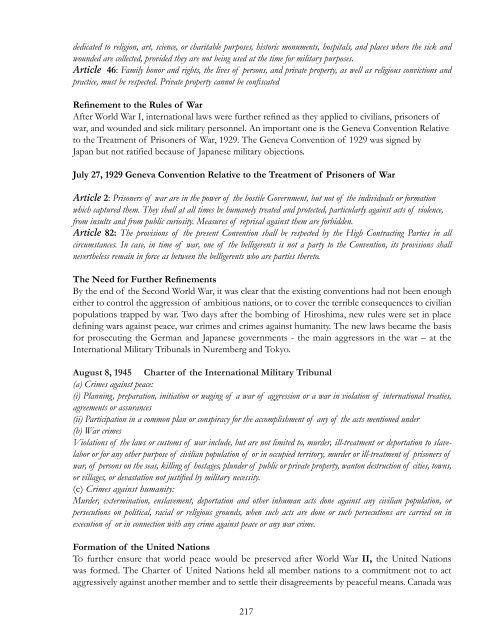Download - Canada ALPHA
Download - Canada ALPHA
Download - Canada ALPHA
You also want an ePaper? Increase the reach of your titles
YUMPU automatically turns print PDFs into web optimized ePapers that Google loves.
dedicated to religion, art, science, or charitable purposes, historic monuments, hospitals, and places where the sick and<br />
wounded are collected, provided they are not being used at the time for military purposes.<br />
Article 46: Family honor and rights, the lives of persons, and private property, as well as religious convictions and<br />
practice, must be respected. Private property cannot be confi scated<br />
Refi nement to the Rules of War<br />
After World War I, international laws were further refi ned as they applied to civilians, prisoners of<br />
war, and wounded and sick military personnel. An important one is the Geneva Convention Relative<br />
to the Treatment of Prisoners of War, 1929. The Geneva Convention of 1929 was signed by<br />
Japan but not ratifi ed because of Japanese military objections.<br />
July 27, 1929 Geneva Convention Relative to the Treatment of Prisoners of War<br />
Article 2: Prisoners of war are in the power of the hostile Government, but not of the individuals or formation<br />
which captured them. They shall at all times be humanely treated and protected, particularly against acts of violence,<br />
from insults and from public curiosity. Measures of reprisal against them are forbidden.<br />
Article 82: The provisions of the present Convention shall be respected by the High Contracting Parties in all<br />
circumstances. In case, in time of war, one of the belligerents is not a party to the Convention, its provisions shall<br />
nevertheless remain in force as between the belligerents who are parties thereto.<br />
The Need for Further Refi nements<br />
By the end of the Second World War, it was clear that the existing conventions had not been enough<br />
either to control the aggression of ambitious nations, or to cover the terrible consequences to civilian<br />
populations trapped by war. Two days after the bombing of Hiroshima, new rules were set in place<br />
defi ning wars against peace, war crimes and crimes against humanity. The new laws became the basis<br />
for prosecuting the German and Japanese governments - the main aggressors in the war – at the<br />
International Military Tribunals in Nuremberg and Tokyo.<br />
August 8, 1945 Charter of the International Military Tribunal<br />
(a) Crimes against peace:<br />
(i) Planning, preparation, initiation or waging of a war of aggression or a war in violation of international treaties,<br />
agreements or assurances<br />
(ii) Participation in a common plan or conspiracy for the accomplishment of any of the acts mentioned under<br />
(b) War crimes<br />
Violations of the laws or customs of war include, but are not limited to, murder, ill-treatment or deportation to slavelabor<br />
or for any other purpose of civilian population of or in occupied territory, murder or ill-treatment of prisoners of<br />
war, of persons on the seas, killing of hostages, plunder of public or private property, wanton destruction of cities, towns,<br />
or villages, or devastation not justifi ed by military necessity.<br />
(c) Crimes against humanity:<br />
Murder, extermination, enslavement, deportation and other inhuman acts done against any civilian population, or<br />
persecutions on political, racial or religious grounds, when such acts are done or such persecutions are carried on in<br />
execution of or in connection with any crime against peace or any war crime.<br />
Formation of the United Nations<br />
To further ensure that world peace would be preserved after World War II, the United Nations<br />
was formed. The Charter of United Nations held all member nations to a commitment not to act<br />
aggressively against another member and to settle their disagreements by peaceful means. <strong>Canada</strong> was<br />
217


